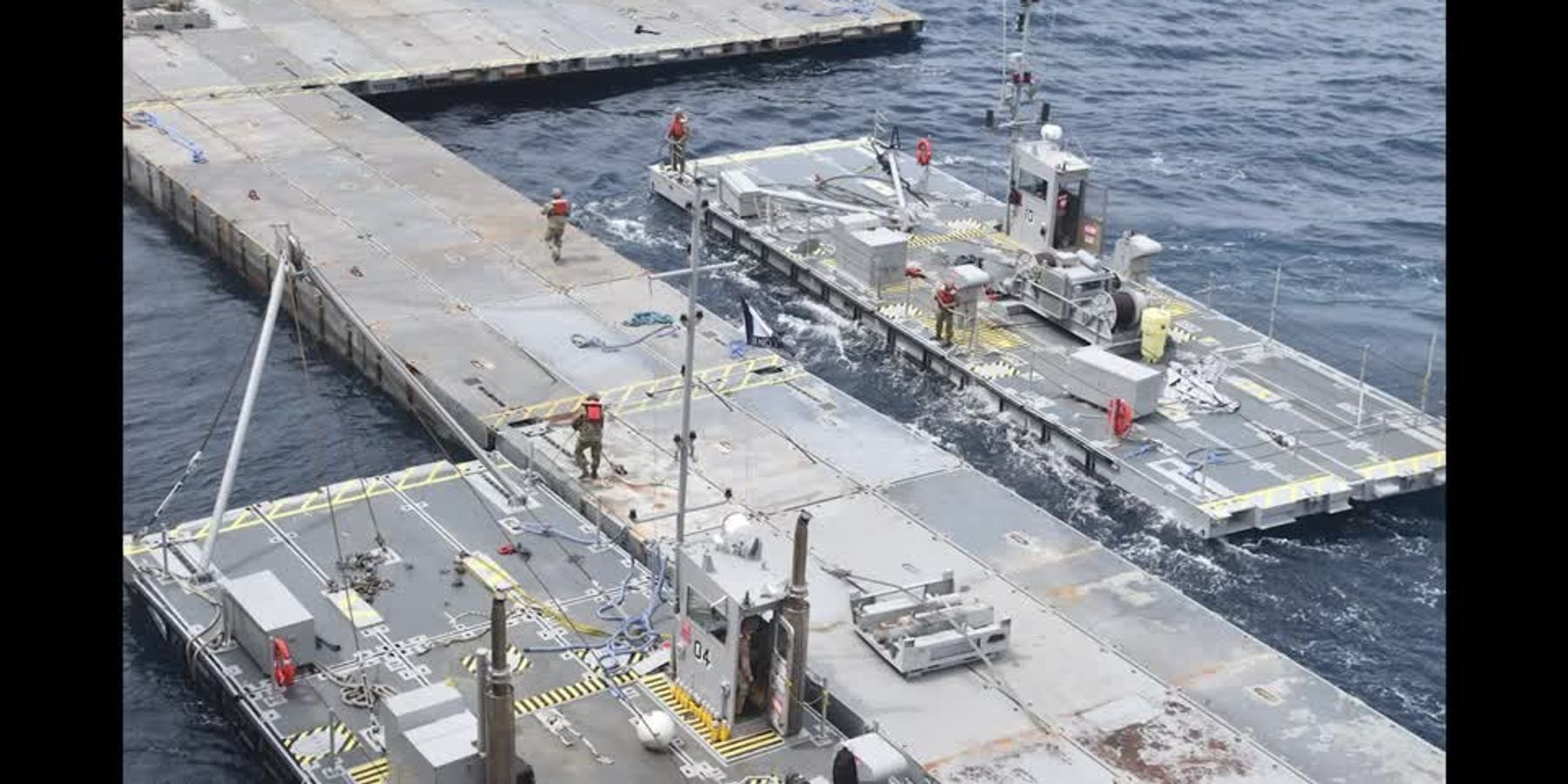UPDATE, 5/17: As of early Friday, the U.S. military said the first shipments of aid have been delivered onto the Gaza beach via the new pier project. The initial delivery included food bars for 11,000 people, therapeutic food for 7,200 malnourished children, and hygiene kits for 30,000 people, according to the U.S. Agency for International Development. The British government said it had sent 8,400 temporary shelters made up of plastic sheeting. Officials did not say how or when it would be delivered by World Food Program and aid partners into the strip.
The fact that the U.S. military pier project off the coast of Gaza was temporarily stalled last week due to high swells and winds is symbolic of the challenges it now faces as it is reportedly opening for business within the next 24 hours.
So what do we know? A trident pier the length of five football fields is being anchored to the Gaza coast. Humanitarian aid will be dropped off there via ships from the floating pier, also built by the U.S. military, two miles off the coast. According to the Pentagon, two Navy warships will be protecting the floating pier and the sea bound transfer of the aid. Some 1,000 U.S. service members are engaged in the project, which is costing an estimated $320 million for the first three months. U.S. personnel are not supposed to be going "on the ground" in Gaza at any time.
The military will be working with the World Food Program to deliver the aid into Gaza once it hits the beach. DOD officials say they hope to surge some 90 trucks of assistance into Gaza at first, ramping up to 150 trucks a day.
It's what we don't know that should have DOD officials and other interested parties — including military families and the American people — quite concerned.
— The DOD is still not clear as to who will be providing security for this massive operation on the beach. When asked at the daily Pentagon briefing Tuesday, this is what Air Force Gen. Pat Ryder, spokesman, had to say:
"So as you know, U.S. Central Command has been working very closely with USAID, Israelis, other partners in the region on putting together a comprehensive security plan for this temporary pier and the aid distribution routes.
And so a lot of work has gone into that, and of course as we've said all along, force protection is going to continue to be of paramount concern. All that to say we do believe that we have the — the pieces and parts in place so that when we do begin operations, we're confident that — that we'll have the security in place that we need."
Two weeks ago, in a exchange with Rep. Matt Gaetz (R-Fla.) in a House hearing, Secretary of Defense Lloyd Austin admitted there is a "possibility" that U.S. military on the trident pier could be attacked. In fact, U.N. representatives on the beach came under mortar fire earlier in May.
“Hamas is already reconstituting cells in the north and elsewhere in Gaza. There are intelligence gaps on the ground that could allow for a surprise attack,” Michael DiMino, a former CIA military analyst and counterterrorism officer now serving as public policy manager and fellow at the Defense Priorities, tells RS.
“As the pier prepares to begin operations, maintaining security both around the pier itself and at the point where aid is transferred to civilians ashore remains a top concern,” DiMino added.
— We don't know if aid can safely get into Gaza. The Israelis say they are on board with the project, but their track record includes backed-up trucks at every crossing, and continued attacks on aid workers (including a U.N. representative, who came under tank fire this week). Israel just took over the Rafah crossing and shut down all aid from coming in, and anyone who was scheduled for critical medical attention, from getting out. Even if the Israelis were to let the World Food Program workers through to deliver the assistance they would be traveling into a war zone in which the chances they would come under direct fire or crossfire are pretty great.
— We don't know where the trident pier is. Earlier reports have pegged it somewhere north of the "humanitarian zone" at Al-Mawasi on the beach and south of the Israeli controlled corridor splitting the Gaza strip in two. As experts have said, the trident pier must be aggressively maintained with military engineers. It is not clear how that is going to happen, or whether the Pentagon is hiring contractors do do that work.
— Finally, how long will this pier be in operation? When asked, the DOD won't say.
To ask "why" wouldn't hurt either. Ryder said yesterday, "as, you know, we continue to see challenges in terms of getting aid in via ground, we're going to continue to employ this method to work with the international community to get aid in to the people of Gaza." Wouldn't using U.S. leverage to ensure land routes were opened, rather than spending millions in U.S. taxpayer dollars and putting U.S. service members at risk be a better option?
















